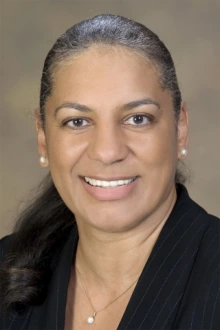Dr. Patricia Harrison-Monroe Honored for Expanding Mental Health Services to Underserved Communities
Patricia Harrison-Monroe, PhD, University of Arizona College of Medicine – Tucson clinical associate professor and vice chair of the Department of Psychiatry, has won the UArizona Frances McClelland Institute Vision Award. This honor is bestowed upon a community leader who has made a lifelong commitment and significant contributions to the well-being of children, youth and families, and was awarded to Dr. Harrison-Monroe for her work to improve access to quality mental health services for youth, adults and families in Southern Arizona.

Patricia Harrison-Monroe, PhD
“It is such a tremendous honor to receive the 2020 Frances McClellan Institute Vision Award,” said Dr. Harrison-Monroe in her acceptance speech. “I’ve been particularly gratified over the years to provide training to future mental health providers, psychologists and psychiatrists, emphasizing the importance of individualized, holistic, and strength-focused treatment and advocacy. Addressing community mental health needs with a focus on prevention, and from a holistic perspective, is not just preferable, but imperative.”
Dr. Harrison-Monroe is director of community outreach and clinical development for the Department of Psychiatry, and was instrumental in launching the nationally recognized Banner University Medicine Whole Health Clinic, which provides mental health and other health care to Medicaid patients. She is director of the clinic’s Early Psychosis Intervention Center (EPICenter), overseeing clinical services for teenagers and young adults in the early stages of psychotic illness, and their families.
“Dr. Harrison-Monroe is a bridge builder who meaningfully and tirelessly connects with unrepresented communities, often outside of regular hours, to educate, support, encourage and share better ways to care for our youth,” said Gustavo Perez, PhD, lead psychologist at EPICenter and assistant professor of psychiatry, in nominating Dr. Harrison-Monroe. “I have witnessed her passionate advocacy for more equitable and comprehensive services for youth struggling with serious mental illness. Her energy is contagious and her leadership is inspiring.”
When designing EPICenter, Dr. Harrison-Monroe combined the clinical service with an educational component that trains clinical psychologists at the predoctoral level and psychiatric residents. The program’s goal is to diagnose psychotic illness and start rehabilitation early, ushering patients from acute illness to symptom stability and active involvement in their recovery process.
“I have personally attended several ‘graduation celebrations,’ when young men and women, after five years in the program, expressed their appreciation that EPICenter had helped them ‘get it together’ to enroll in community college, successfully apply for an entry-level job, develop wholesome leisure-time pursuits and build lasting friendships,” wrote Ole J. Thienhaus, MD, MBA, then chair of the Department of Psychiatry, now retired, in his nomination letter for Dr. Harrison-Monroe. “The design and implementation of the EPICenter is an outstanding example of a distinguished clinical-academic career devoted to the improvement of the lives of the mentally ill in our community.”
Dr. Harrison-Monroe is an active member of the community and sits on several boards. Named as one of the 25 most influential African Americans in Arizona by the Southern Arizona Black Chamber of Commerce, her work has been recognized on a local and national level, including by the NAACP and Alpha Kappa Alpha. She is a frequently invited guest speaker and consultant on topics such as multicultural counseling, early intervention and care integration, and forensic mental health, as well as public health care policy and its effect on at-risk populations. She also maintains a private practice.
“We have all witnessed the significant stigma individuals impacted by mental health issues continue to face, so community education about mental illness and active outreach have been a key focus for me. However, the struggle to access needed services continues,” Dr. Harrison-Monroe said. “Increasingly, and fortunately, leaders are taking notice that ignoring those with mental health challenges is costly, not just to the individual, but to our society as a whole. Change is possible.”
See Dr. Harrison-Monroe’s acceptance speech at the awards ceremony on YouTube.

